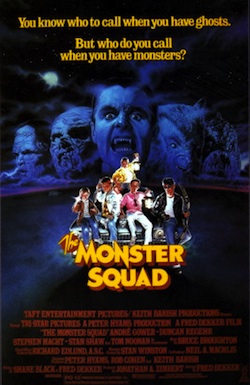A brief note about 80s nostalgia, as specifically pertains to movies, before we begin. Each generation gets nostalgic for the stuff they liked when they were kids—some individuals are immune, sure, I’m talking in general—and it’s always fun for younger people to make fun of older people about the stupid stuff they get all weepy over, because that’s a big part of what old people are there for, and it’s also hilarious to watch said old person try and explain “no, but this is why what I’m talking about is different.” This is why I’m writing this while imagining a bunch of wiseass kids the approximate age of the protagonists in 1987’s The Monster Squad reading this and smirking about “look at gramps and his elliptical exegesis of the 1980s as the sunset era of the B-movie, ridden with logical fallacies and ultimately a more perfect illustration of his lack of objectivity about the history of cinema than even any we can construct.”
To those kids I say, get off my lawn. The Monster Squad belongs to a distinctly historical era in movies, and is a love letter to a kind of picture they don’t make anymore, and barely even still made at the time of its release. And, to further counter the charges of nostalgic subjectivity leveled at me by my straw brats (who have PhDs in philosophy for some reason), I can say, I only heard of The Monster Squad a couple days before writing this.
Watching one of the more beloved cult movies of the 80s from this perspective was interesting, and the fact that after about twenty minutes I felt like I had grown up with it even more so. The Monster Squad is the straightforward, very funny story of a group of kids, ranging in age from about 5 up to teenage, bonded by their love for monster movies and monster lore who end up having to defend their town from Count Dracula, Frankenstein’s monster, the Wolfman, and the Mummy, and Gill Man. The group consists of a variety of familiar types, but either done well or with a bit of a twist, as in the case of Rudy, the cool older kid who smokes cigarettes and wears a leather jacket and scares bullies and is interested in girls and stuff but who at heart is just as big a nerd as the rest of them. There is a bit of tired, been-here-done-that fun made at the fat kid’s expense, as he’s presented as not terribly bright and a bit of a coward, though he does eventually redeem himself and engage in some of the movie’s more impressive and resourceful heroics.
Really, though, the stars of The Monster Squad are the monsters. They’re the unifying element that brings a widely disparate group of kids together, and then over the course of the movie that connect the kids to the grownups who initially think them a bit odd. Director Fred Dekker and co-writer Shane Black illustrate a number of different reasons people love movie monsters, one embodied in each monster. There’s the evil unstoppable one, the silly incompetent one, the gross one, the tragic reluctant one, and even the one who reveals himself to be an ally and friend to the heroes. It’s not this academic, the way Dekker and Black lay it out, it’s just matter of fact, and whether or not you’re analyzing things or just enjoying them, you come to the same result.
With that in mind, there’s not much more substantive one can say about The Monster Squad than, it’s fun. I don’t know if I could recommend it to anyone under the age of about 27 without a crash course on 80s genre cinema, but as a friend of mine said in flabbergasted disbelief when I told him I’d never seen the movie before, “Weren’t you a kid? Say, in the 80s?” And that’s the point of The Monster Squad. Anyone who was a kid (of any age) in the 80s is going to understand this picture instantly and love it, if they don’t already. It’s one of the rare pictures where the intellectual, film theory approach [7500 word digression about the semiotics of nostalgia redacted at Stubby the Rocket’s exasperated request] and the emotional, subjective geek approach yield the same conclusion: the movie’s just fun. That’s all. It’s fun, and it’ll make you feel like a kid again, if you were a kid then.
Danny Bowes is a playwright, filmmaker and blogger. He is also a contributor to nytheatre.com and Premiere.com.










